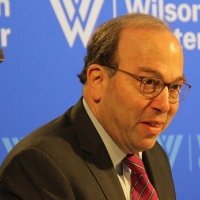Regional Economic Outlook for Sub-Saharan Africa: Domestic Revenue Mobilization and Private Investment
On May 22, 2018, the Wilson Center Africa Program co-hosted a panel discussion about the April 2018 Regional Economic Outlook for Sub-Saharan Africa report with the International Monetary Fund (IMF). Ms. Deborah Carey, Program Assistant with the Africa Program, provided welcome remarks. Dr. Witney Schneidman, Senior Advisor for Africa at Covington & Burling LLP and member of the Wilson Center Africa Program Advisory Council, moderated the event. The Director of the African Department at the IMF, Mr. Abebe Aemro Selassie, presented the key findings of the report. Dr. Brahima Sangafowa Coulibaly, Director of the Africa Growth Initiative and Senior Fellow with Global Economy and Development at The Brookings Institution, acted as a discussant.
Mr. Selassie opened with the three major findings of the April 2018 Regional Economic Outlook. The first is that after three years of poor growth outcomes, about two thirds of the region is experiencing economic recovery. Growth in the region is accelerating from 2.8 percent to 3.4 percent this year and is projected to rise further to 3.8 percent in the following year. While these growth rates fall short of the growth rates experienced in years previous to 2015-16, they suggest recovery. This larger picture masks a great deal of diversity within the continent, however. Some large, and particularly oil-exporting countries—such as Angola and Nigeria—were hit hard by the commodity price decline and are still in the process of recovering. In addition, there are a few countries where sustained unrest and civil conflict creates a drag on growth. The broad factors leading to increased growth in the region include the acceleration of global economic growth, global economic recovery, and the easing of global financing. The second key finding of the report is that the decline in commodity prices has shocked the region, leading to an increasing level of public debt. Debt has been growing over the past 5-8 years, and this will remain a factor that requires focus. The region should work towards strengthening revenue mobilization. While another way forward would be to cut spending, many countries in the region have high spending needs. Therefore, raising revenues and facilitating private investment will be key. The real concern is not purely the increase in debt itself, but that government budgets have not gone up accordingly. Six countries in the region are considered debt distressed, while nine countries are at risk of being debt distressed. It is important for countries to become more comfortable with servicing debt levels, serious about addressing drivers of public sector growth, and focused on fostering competitiveness. The final takeaway of the report is that it is crucial for countries to utilize this period of growth to facilitate private sector investment and build on existing gains. In general, Mr. Selassie was optimistic about economic prospects in Sub-Saharan Africa. With stronger policy frameworks, there is a good chance that the region can catch up to global growth. Future work must focus on addressing the policy constraints that hold back growth.
Dr. Coulibaly re-emphasized that growth projections for the region are broadly consistent among the international financial institutions. What is less clear, he explained, is the narrative around the growth. Until 2014, the story was simple: with growth rates at 5 or 6 percent, Africa was rising. The 2014 shock in commodity prices led to a tank in Africa’s overall growth to around 1.8 percent. Since then, the recovery narrative has been complex and heterogeneous. The economic activity of Angola, Nigeria, and South Africa often confuses wider trends in the region. Taking these three economies out of the aggregate, a brighter picture emerges of overall growth at around 5 percent. Half of the fastest growing economies are on the continent. Over the next five years, there are going to be more countries growing at least as fast as they were during the years when the “Africa rising” narrative prevailed. Pessimism about Africa’s growth prospects arises out of efforts to simplify the narrative and not focus on country-specific stories. Differentiation will be key going forward to understand the story of struggle but also of resilience. Countries are on different paths, and the oil-dependent states are still recovering from the commodity decline. Dr. Coulibaly emphasized that the chapters of the report on domestic resource mobilization and private investment are key. While the debt levels themselves are not too alarming, the worrying feature is the pace of increase. To address debt issues while continuing to finance key development priorities, Dr. Coulibaly suggests increasing domestic resource mobilization, boosting private savings, increasing investment in infrastructure, and crowding in more private sector investment. About 4 percent, or 85 billion dollars, of Africa’s GDP is lost to inefficiencies. Africa must address corruption, democratic accountability, and illicit financial flows to close the gap. Africa has significant internal resources to finance its development needs; it needs to work on how to harness these better. Finally, Dr. Coulibaly addressed the imperative to create jobs for Africa’s growing populations. Job creation is a key component of leveraging growth to improve livelihoods on the continent.
Introduction

Moderator

Panelists
Hosted By

Africa Program
The Africa Program works to address the most critical issues facing Africa and US-Africa relations, build mutually beneficial US-Africa relations, and enhance knowledge and understanding about Africa in the United States. The Program achieves its mission through in-depth research and analyses, public discussion, working groups, and briefings that bring together policymakers, practitioners, and subject matter experts to analyze and offer practical options for tackling key challenges in Africa and in US-Africa relations. Read more
